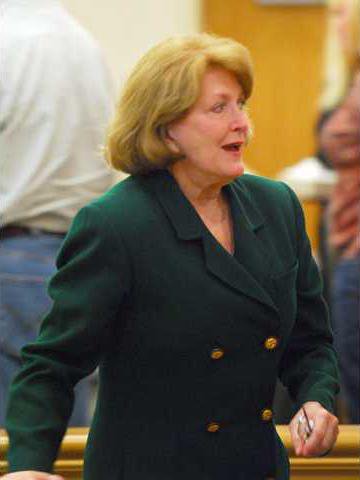The bestselling 2003 novel "The Red Hat Club" treaded a little too close to one woman’s real life, a Hall County jury decided Thursday in a case that could have wider implications in the publishing world.
Vickie Stewart won her defamation lawsuit against author and former friend Haywood Smith when a Hall County State Court jury found that the book libeled her by including a fictional character that closely resembled Stewart. The "SuSu" character in Smith’s humorous novel about Buckhead socialites shared more than 30 similarities with Stewart, including where she grew up, the jobs she held and how her first husband died. Stewart sued for defamation because SuSu is portrayed in the book as a sexually promiscuous alcoholic.
"All I wanted is for this not to happen to anyone else," a tearful Stewart said after thanking members of the jury for their verdict. "I am so appreciative of this jury, that took it upon itself to do something that will make our country a little better, and hopefully make our publishing laws better. This should not have happened."
The lawsuit was filed in Hall County because Smith lived in the Hall County portion of Buford when the book was published. According to court testimony, about 600,000 copies of "The Red Hat Club" were published by New York-based St. Martin’s Press and the book landed on the New York Times bestseller list.
The case could become a landmark in Georgia case law, if not U.S. law.
Attorneys say most defamation suits involving works of fiction have either been settled or thrown out before they got to trial.
Stewart’s case survived several defense challenges and her right to take it to trial was upheld by Hall County Chief State Court Judge Charles Wynne and the Georgia Court of Appeals. The Association of American Publishers filed a brief in support of the defense in an unsuccessful effort to have the case dismissed. The Georgia Supreme Court refused to hear a pretrial appeal of the lower court rulings.
Thursday’s legal victory for Stewart was tempered, however, by a relatively small $100,000 award for damages, with the jury refusing to award her attorneys fees. The cost of litigating the case over the last five years likely exceeded $100,000.
The jury of eight men and four women deliberated the case for about six hours over two days before finding for the plaintiff on the defamation claim. The jury rejected an invasion of privacy claim.
Jury foreman Bill Rezak said afterward that the panel concluded Stewart was hurt by the book’s portrayal of SuSu. Several of Stewart’s friends testified they recognized the character as the 63-year-old Atlanta native.
"Based on the judge’s very specific jury charge with respect to defamation ... we decided there was indeed some defamation, and tried to make the award commiserate with the amount of injury she suffered," Rezak said.
Prior to deliberations, Wynne instructed the jury on Georgia defamation law.
In order to find libel, a jury must find that a publication contains false and defamatory statements concerning the plaintiff that were communicated to a third party, that the person making the statements was negligent by not exercising ordinary care in making them, and that the plaintiff was injured by the statements.
Because Stewart is not a public figure, the jury only needed to find there was negligence, not actual malice.
Smith, the author, said she was disappointed with the jury’s verdict but that she respectfully accepted it.
"I hope this is healing for Ms. Stewart," Smith said. "It was never my intention to bring her any harm. I hope this is healing for her and she can put all of this behind her, which I certainly plan to do."
Peter Canfield, the First Amendment attorney representing Smith and codefendant St. Martin’s Press, said they would seriously consider an appeal. During the trial, both sides made objections to the instructions on the law that Wynne gave the jury, which is typical of attorneys in civil cases.
"We believe the law protects works of fiction, and this was a work of fiction," Canfield said. "But there was some confusion created by the (jury) instructions."
While attorneys from both sides said they were uncertain whether the case could set a legal precedent, one expert on libel law said cases in which defamation is found in fiction go back at least to the 1970s.
In 1979, the California Court of Appeals upheld a libel verdict awarded to a psychologist whose unusual methods were depicted in a novel.
"It’s well established that ... libel in fiction is actionable, and as long as there are people who can recognize that the character depicted in a defamatory manner is in fact the plaintiff, even though the names are changed," said California attorney Tony Glassman, who currently has a libel suit pending against the television series "CSI." I don’t think there’s anything new at all in a finding of liability."
Plantiff's attorney Jeffrey Horst said he was hopeful the verdict would send a message to publishers.
"Hopefully it was a sizeable enough verdict to cause publishers to sit up and take notice and have some policies and procedures in place to prevent this sort of thing from happening," Horst said, adding that it may not, given the amount of damages awarded.
Rezak, the jury foreman, said the verdict might cause publishers to use more caution.
"If someone is going to use a great deal of specificity about the details of someone else’s life, I would think that they should be cautious and get their permission to do so, or change the character to the extent that it doesn’t defame someone," Rezak said.

